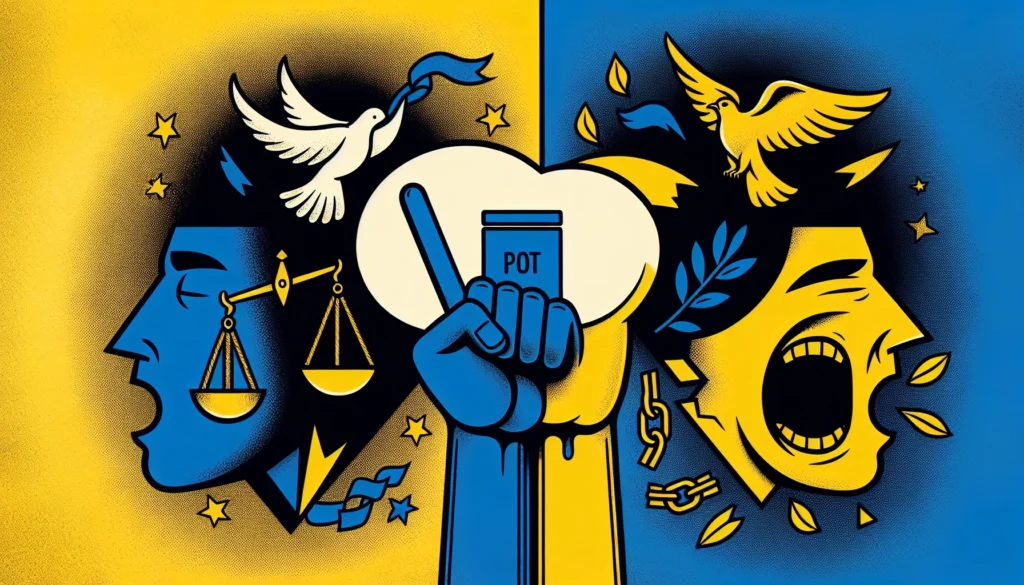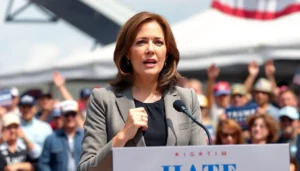In the heart of Eastern Europe lies Belarus, a country often overshadowed by its political dramas and election spectacles. When election season rolls around, it’s like watching a high-stakes game of chess where the pieces seem to be glued to the board. With a long-standing leader and an opposition that’s often more elusive than a cat at bath time, the Belarus elections are anything but ordinary.
As the world tunes in, questions swirl: Are these elections a true reflection of democracy or just a grand illusion? With a blend of intrigue, controversy, and a sprinkle of humor, this article dives into the fascinating landscape of Belarusian politics. Buckle up for a ride through ballot boxes, protests, and the occasional plot twist that keeps everyone guessing.
Table of Contents
ToggleOverview of Belarus Elections
Belarus elections present a complex interplay of political maneuvering and societal expectations. The integrity and fairness of these elections often spark debate among citizens and observers.
Historical Context
Belarus’ electoral history encompasses significant events since its independence in 1991. The first president, Alexander Lukashenko, came to power in 1994 and established an authoritarian regime. Controversial elections in 2001, 2006, and 2010 resulted in widespread accusations of fraud and led to protests. In 2020, the presidential election saw Lukashenko claiming 80% of the votes amidst significant unrest. The opposition, led by figures like Svetlana Tikhanovskaya, emerged with substantial support, challenging the regime’s legitimacy. These historical occurrences underline the systemic issues affecting Belarusian democracy.
Recent Developments
Recent elections further illustrate ongoing tensions in Belarus. In 2023, the electoral climate remained fraught with restrictions on opposition candidates and media. Authorities intensified crackdowns on dissent, making it difficult for independent observers to assess the electoral process. Despite efforts by opposition groups to mobilize support, repression limited their effectiveness. International reactions included condemnation from Western nations, viewing these elections as lacking credibility. The geopolitical significance of Belarus also came into play, influencing both internal and external political dynamics.
Key Players in Belarus Elections
Belarus’ electoral landscape features key players that significantly influence political dynamics. The actions of these individuals and organizations shape the country’s electoral processes.
Political Parties
Several political parties operate in Belarus, each contributing to the country’s political discourse. The pro-government party, the Belarusian Republican Party, maintains strong ties to President Alexander Lukashenko. Opposition parties, such as the United Civic Party and the Belarusian Popular Front, advocate for democratic reforms but face systemic repression. The lack of a unified opposition often hampers their effectiveness. Additionally, smaller parties attempt to gain traction but struggle under severe limitations imposed by the state.
Notable Candidates
Notable candidates have emerged in recent elections, each representing distinct political visions. Alexander Lukashenko remains a dominant figure, holding the presidency since 1994. Svetlana Tikhanovskaya gained prominence during the 2020 election, representing a united opposition front. Her candidacy resonated with many voters, sparking protests against electoral fraud. Other figures, such as Siarhei Tsikhanouski and Pavel Latushka, have also sought to challenge the status quo, though their efforts often face significant hurdles. Each candidate’s ability to mobilize support illustrates the ongoing struggle for democratic reform in Belarus.
Election Process and Regulations
The electoral process in Belarus is marked by intricate regulations that govern voting and monitoring. Key aspects of these processes come into play during election time.
Voting Procedures
Voting in Belarus involves several steps. Voters must present identification to register and participate. Polling stations remain open from 8 AM to 8 PM on election day. Absentee voting is available for citizens unable to vote in person. Furthermore, electronic voting remains uncommon, with traditional paper ballots predominantly used. Observers frequently highlight ballot box integrity as a concern. Votes are counted at polling stations, with results often announced within hours. Despite these procedures, the global community frequently questions their reliability due to reported irregularities.
Observations and Monitoring
Election monitoring in Belarus faces significant challenges. Independent observers encounter barriers, limiting their ability to assess transparency. International organizations often call for clearer regulations defining monitoring roles. Domestic groups, like the Belarusian Helsinki Committee, strive to document violations. However, restrictions on opposition candidates hinder comprehensive monitoring. Security forces frequently intimidate observers, raising concerns about their impartiality. As a result, the scrutiny of the electoral process remains hampered. Many citizens express frustration over the lack of credible oversight, heightening skepticism about electoral legitimacy.
Public Response and Protests
Public sentiment in Belarus reflects deep frustration and skepticism regarding the electoral process. Citizens express concerns about the fairness of elections and government repression of dissent. Many believe that their voices go unheard amidst systematic crackdowns. Observers note widespread disillusionment with the ruling regime, prompting larger public mobilization for change. The ongoing repression has escalated public protests, particularly following disputed elections in recent years.
Citizen Sentiment
Sentiment among Belarusian citizens often skews toward anger and betrayal. Many express disappointment over the government’s handling of elections and subsequent crackdowns on opposition. Public opinion surveys indicate a significant portion of the population seeks democratic reform. They show a willingness to support opposition leaders who advocate for change. The rise of social media platforms has amplified voices calling for justice, bridging gaps between urban and rural populations. Individuals increasingly engage in discussions surrounding electoral legitimacy, fostering collective action against perceived injustices.
Impact of Protests on Elections
Protests significantly influence the electoral landscape in Belarus. Demonstrations following the 2020 election led to increased scrutiny of electoral practices. These events forced government officials to respond, yet responses often involved stricter measures against dissent. In turn, fears of retribution deterred many observers from participating in subsequent elections. Opposition leaders gained notoriety, demonstrating the power of collective activism. The resilience displayed during protests fostered community solidarity, emphasizing the demand for transparency and accountability. Public demonstrations continue to shape both local and international perceptions of Belarusian democracy.
International Reaction
International reactions to the Belarus elections reflect deep concern over the integrity of the electoral process. Observers note widespread condemnation from various nations and organizations.
Responses from Neighboring Countries
Neighboring countries, particularly Poland and Lithuania, expressed strong criticism. They labeled the elections fraudulent and called for the release of political prisoners. Leaders in these nations voiced solidarity with Belarusian opposition groups. Economic sanctions were implemented to pressure the Lukashenko regime, demonstrating regional support for democratic reforms. Border security measures heightened to manage potential influxes of Belarusian refugees seeking safety.
Global Community’s Stance
The global community largely perceives the elections as lacking legitimacy. The European Union denounced the electoral conduct, urging member states to impose stringent sanctions on Belarusian officials. Meanwhile, the United States echoed similar sentiments, reaffirming support for the Belarusian people’s right to a fair electoral process. Organizations like Amnesty International reported human rights abuses during the electoral period, calling attention to the systematic suppression of dissent. Collective statements from various international bodies emphasize the need for accountability and genuine democratic reforms in Belarus.
Future Implications
Elections in Belarus set the stage for significant political developments. Observers analyze the potential outcomes to determine the impact on governance and civil rights.
Potential Outcomes
Election results often influence the balance of power in Belarus. A consolidation of Lukashenko’s authority could result in intensified repression against opposition and dissent. Increased opposition success might lead to wider public mobilization for democratic reforms. Alternatively, continued unrest could escalate international sanctions and diplomatic isolation. Each scenario presents clear ramifications for civil society. Voter sentiment plays a crucial role in shaping these dynamics.
Predictions for Political Landscape
The political landscape in Belarus shows signs of potential transformation. If opposition parties gain traction, prospects for reform increase. Continued crackdowns may incite stronger public backlash, potentially destabilizing the regime. Analysts emphasize the importance of grassroots movements in shaping future political responses. Geopolitical influences also impact internal dynamics, as regional neighbors watch closely. Increased international pressure may force the government to reconsider its stance on human rights and democracy. Observations hint at enduring challenges but also possibilities for change within Belarus.
The political landscape in Belarus remains highly charged as elections continue to unfold under the shadow of repression and skepticism. Citizens yearn for a democratic process that truly reflects their voices and aspirations. The resilience shown during protests illustrates a growing demand for accountability and reform.
As international scrutiny intensifies and neighboring countries voice their concerns, the future of Belarusian democracy hangs in the balance. The outcome of these elections could either consolidate the current regime’s power or ignite a movement towards meaningful change. The world watches closely as the people of Belarus navigate this complex and challenging political terrain.





